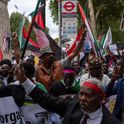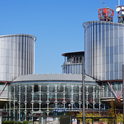In 1996 Nelson Mandela made one of those principled statements which are his trademark. Under pressure from China to sever South Africa's diplomatic relations with Taiwan and to establish them with Beijing, he said: "It's not easy for me to be assisted by a country and then to say, once I am in power: 'I have no relations with you.' That is not my morality and I will not do it." He even had a bit of advice for the Chinese: "This is an internal matter. Resolve your own problems. Don't expect us to."
When I read this in 1996 I confess I sneered. In December 1997 I sneered again when Pretoria and Beijing agreed to exchange ambassadors. Why? Because six years earlier I had already reached the conclusion that Mandela was as "pragmatic" as any other international politician.
It was April 1991. Mandela had recently emerged alive from Robben Island; not long before that the Chinese army had shot innocent people in Tiananmen Square. The place was Kyoto, where the International Press Institute was holding its annual convention. Hundreds of journalists from all over the world came to hear Robert McNamara, former US secretary of defence, who admitted for the first time in public that the Vietnamese war was "wrong." There were various other speakers, including myself, who talked about the press's role during Tiananmen. Then Mandela spoke. He was the most admired man in the world at the time.
Mandela, who was on his way from Japan to China, was the focus of the conference. We hung on his every word as he praised the press for having stood by him during the apartheid years. We felt a warm glow when he assured us that if we had not kept his name alive he would have died long ago. Then he turned to human rights, to freedom and liberty, and to the need to stand up for them-no matter what the circumstances and the cost. The words he used still stick in my mind: human rights, he said, were "international and indivisible." We cynical journalists stood and applauded when Mandela sat down.
Then we queued to ask Mandela questions. When my turn came, I remarked that within 24 hours he would be in Beijing, raising questions, I assumed, about human rights in China-the many political prisoners, the treatment of minorities such as Tibetans and Muslims, the absence of freedom of speech. I thought this would be an easy question for Mandela. His answer would carry immense moral authority; it would also send a signal to Beijing from one of the leaders of the third world-which the Chinese always claim to champion.
Mandela's answer was not what I had expected. He replied that he would not be discussing human rights with his hosts, because "in our darkest hour, the Chinese comrades helped us with weapons, training, money and encouragement." I reminded him that he had just told us that human rights must be raised everywhere without consideration of the circumstances, that they were "international and indivisible."
If there was anything Mandela had learned in prison it was patience. Very calmly he explained again that it would show ingratitude if he confronted his friends in Beijing with such a sensitive matter.
Just after the Pretoria-Beijing agreement was announced in 1997, the South African newspaper Cape Argus scolded Mandela for his "perfidy" in ditching Taiwan, with which Pretoria had long established diplomatic relations. The newspaper wrote wanly: "If you want loyalty, get a dog," and referred to the switch from Taipei to Beijing as an example of Mandela's "whimsy," earlier exhibited in his "bizarre pilgrimage" to Libya where "he honoured... Muammar Gaddafi." Mandela was also establishing "cosy" links with Indonesia, the Argus said, adding that neither state was noted for its human rights. The Argus suggested that in dropping South Africa's former "pariah" diplomatic partners-Stroessner's Paraguay and Pinochet's Chile-South Africa was now acquiring new ones.
The Argus recalled that, at a recent ANC meeting, Mandela told his comrades "not to forget those who helped them in the struggle against apartheid"-as indeed he had told us back in Kyoto in 1991.
After Mandela's answer to my question in Kyoto, I had retreated to the hotel coffee shop to mull over life's realities. There I was approached by a member of Mandela's staff who told me that his boss wanted to assure me of something. I cheered up. Here, surely, would be proof that the great man was also a principled one. "What Mr Mandela wants me to tell you," said the assistant, "is that not only will he not mention human rights in public in Beijing, he will not do so in private either."












